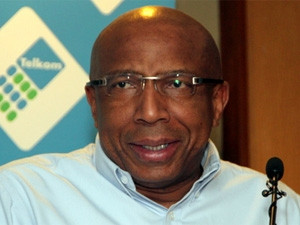
The head of SA's embattled fixed-line operator, Telkom - which is in the midst of a turnaround plan - is facing up to the "hard truth" that it will experience a challenging year and has to do a lot more to improve its performance.
CEO Sipho Maseko wrote this to staff yesterday as he celebrated having been at the helm of the telco for a year, and a day after its 2013/14 financial year closed. The company, which has been making inroads to improve its lacklustre future, has been facing dwindling voice revenue, a declining user base, and a capex-intensive network rollout to get mobile off the ground.
When it issues its results, in the next three months, analysts will be looking for operational improvements, and not just benefits that have accrued because it has tidied up its balance sheet. The company said in March that basic and headline earnings per share would be at least 20% higher in the full year, thanks to getting rid of a post-retirement medical aid liability.
Telkom has also said it needs to cut costs dramatically, and news that it wants to get rid of as many as 1 000 managers and cut its almost 21 000-strong workforce by a third over the next five years had the unions up in arms this January.
Although it has yet to make a firm decision on any retrenchments, staff are tense about possible job cuts and are in limbo, says a well-placed source. The source adds rumours are doing the rounds that the job cuts will happen after the May elections but, although numbers are being bandied around, no information has been provided to staff.
More to do
Maseko says while the company has made good inroads in the past 12 months, it still needs to "do a lot more", which he notes is a "hard truth". "We must recognise that we have a challenging year ahead of us, one that will require even more effort from all of us."
Telkom's future focus includes its biggest challenge and area of concern: "Making it everyone's job to improve the experience of our customers." The operator has long been accused of offering lacklustre customer service, a situation that even Maseko has conceded.
It also needs to use its "technology advantage to own the digital home: the communication devices in residential homes and the connectivity that links them to the world must be ours," says Maseko.
Telkom previously painted a picture of homes connected to a fibre grid, which will allow for on-demand services, and has also asked service providers to pitch to offer triple-play content and services.
Maseko writes that Telkom must also invest in the "right technologies and solutions for our business customers and focusing on a few key areas to make them work". He has said capital expenditure will be cut back and will be sharply focused.
Another priority is to build a fixed and mobile network that is "invincible", says Maseko.
BMI-TechKnowledge MD Denis Smit says fixing Telkom's mobile operations is a key challenge for the year ahead.
Telkom has inked a partnership deal with MTN SA that will see the cellular company take over financial and operational responsibility for the rollout and operation of Telkom Mobile's radio access network, allowing cross-roaming. The arrangement will allow Telkom to keep its mobile play, while saving it from investing vast sums into its mobile arm.
In addition, it will provide both parties with more capacity. However, the exact details of the deal, and when it may be implemented through a joint venture, have yet to be worked out.
Maseko adds Telkom also needs to support the state to "create better services for the nation through a strong digital backbone". The operator has said it wants to play a vital role in government's bid to provide universal access.
Smit notes the exact role has yet to be defined as this is likely to take some time.
Goals met
However, Telkom started to gain some momentum in the past year. Smit says it is turning itself around, and the new executive team should not be underestimated. Yesterday, the company announced the appointment of Ouma Rasethaba as chief risk officer with immediate effect, completing the executive committee structure under Maseko.
It is set to launch "exciting new products and services" during the new financial year. "These will interest our customers and fascinate our friends, and we all need to put our weight behind taking these innovations to the market."
During the past 12 months, the group also resolved outstanding Competition Commission issues, agreeing to settlement deals that started the process towards a functional split in its wholesale and retail businesses.
Just before the end of March 2013, Telkom impaired its legacy assets by R12 billion, which brought its net asset value in line with that of its share price, but knocked profit.
For the year to March 2013, Telkom reported total revenue of R33.1 billion, lower than 2012's R33.7 billion, as decreased voice revenue, which dropped 4.7%, weighed on income.
Operating expenses, which include the R12 billion write-down, leapt significantly from R31.3 billion to R44 billion, dragging Telkom to a comprehensive loss of R11.7 billion, as it has to take the non-cash charge through the income statement.
However, stripping out the impairment, operating expenses increased at a lower level than inflation, at 2.2%, to R32 billion. Maseko says Telkom has also introduced cost-saving measures, and turnaround plans led to "significant savings". It also inked the ground-breaking deal with MTN, which will stop its mobile arm bleeding cash to fund infrastructure, he explains.
"There is growing shareholder confidence in our business, and our share price has increased from R12 to R33 in the last 12 months. This is the best performance in our sector."
Share